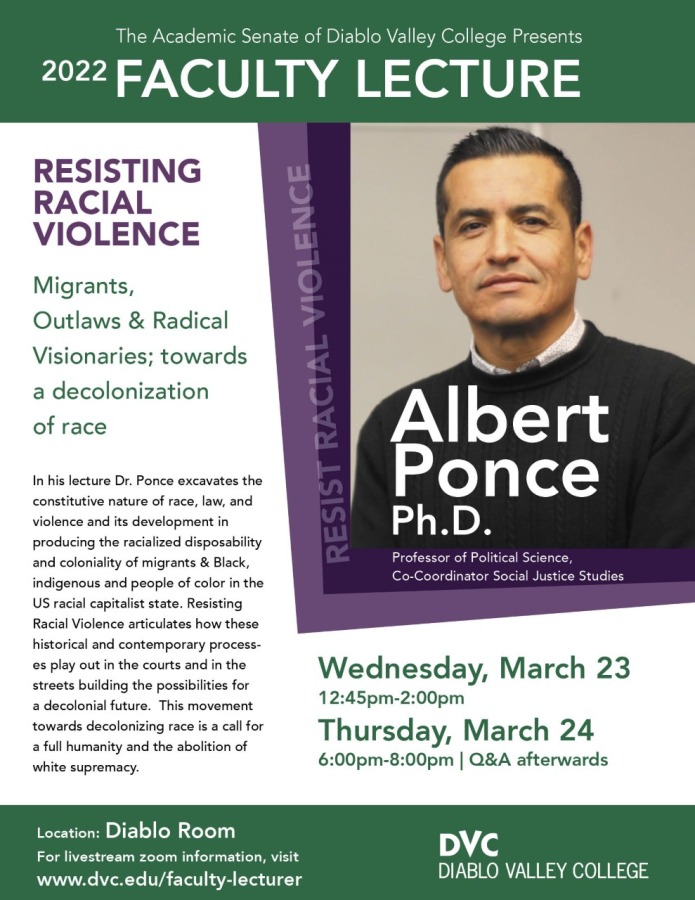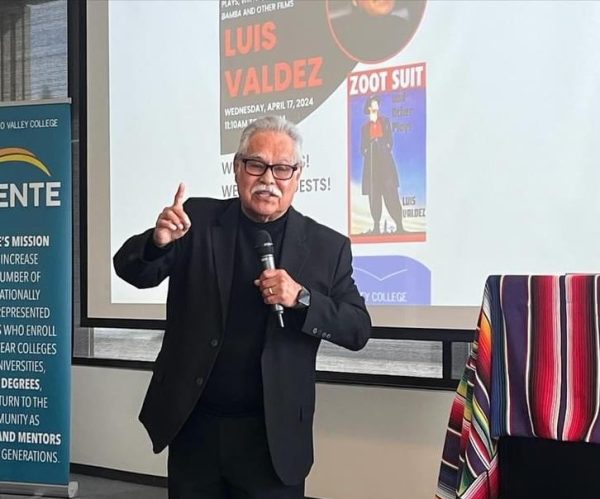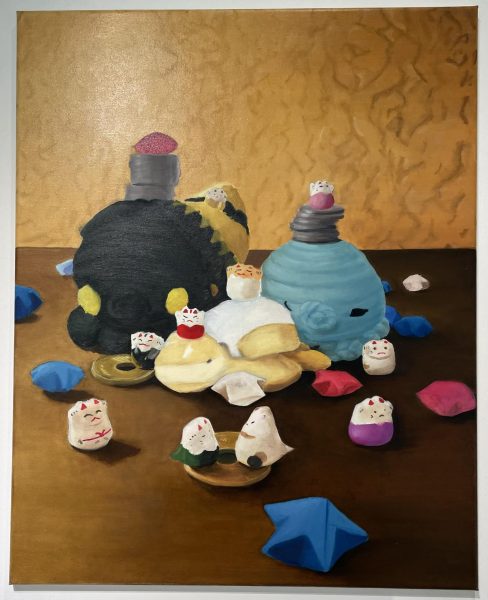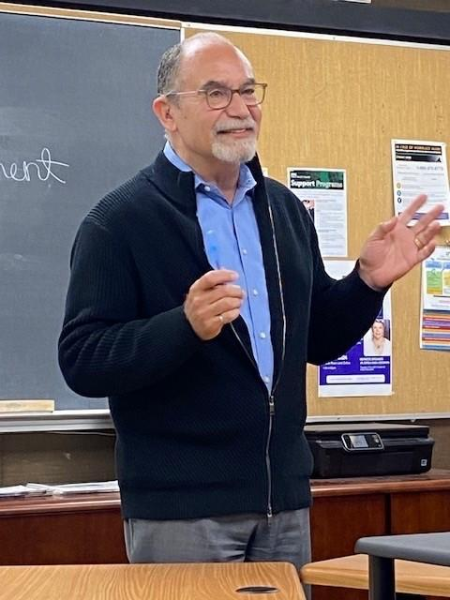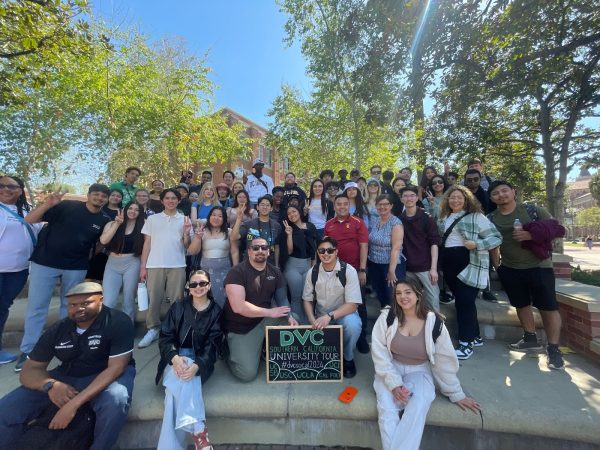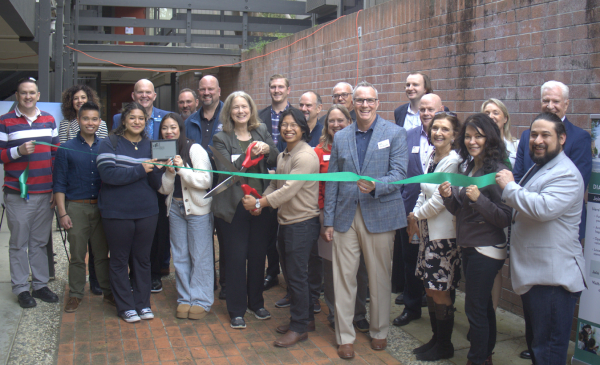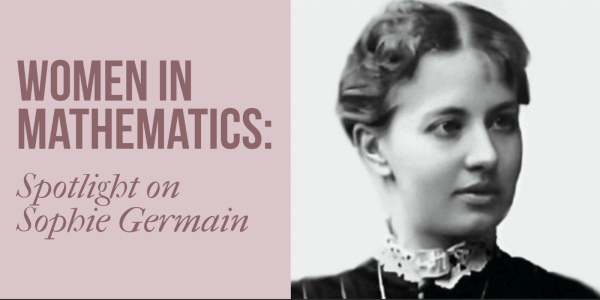“Rigorous Racial Critique”: DVC Faculty Lecturer Dr. Albert Ponce Tackles Racial Inequalities
The Diablo Valley College Academic Senate earlier this spring welcomed faculty lecturer Dr. Albert Ponce, who presented a talk entitled “Resisting Racial Violence: Migrants, Outlaws, & Radical Visionaries: Towards a Decolonization of Race.” The in-person event was held in the Diablo Room and presented via Zoom on March 23-24.
“How is racial violence naturalized, normalized, and an accepted part of the United States?” asked Academic Senate President John Freytag as he opened the event and introduced Ponce. “And why are views on [systemic] racism very divergent in United States society today?”
Ponce himself had posed these questions as part of his faculty lecturer proposal, and they resonated with the Academic Senate Council, said Freytag, resulting in the selection of the DVC political science professor as one of this year’s faculty lecturers.
“Everything I do comes from the collective work that we build in our community, from our colleagues, my comrades, and primarily our students,” Ponce said to begin his talk.
The co-director of DVC’s Social Justice Program, Ponce earned his Ph.D. in political science from UCLA and specializes in race, ethnicity and politics, and political theory. His involvement in social justice issues on campus has included mentoring students in the Puente program, helping the Dreamer’s Alliance aid undocumented students, and working with the Scholars for Justice Club for formerly incarcerated students.
Ponce began his tenure at DVC in the fall of 2016, and delivered a lecture the following year that he said focused on “tracing the philosophical origins of white supremacy into the present.” After the presentation, Ponce received threats and calls for his removal from the school – something he said not only affected him but other educators in the country who had “sparked ideas for critically reflecting.”
“I have friends who do not have a job today,” he said.
Ponce spoke of the need for a “rigorous critique of racial rule in the United States” and said that acknowledging the nation’s past is vital to the growth and forward progress of its people.
He talked about the socio-economic divide between the neighborhood middle school he attended as a youth in Los Angeles County, and the one his daughter currently attends in the Bay Area. His school, he said, was a lower-ranking one.
“We are almost doomed to be damaged by the school,” Ponce said. “We don’t go in there damaged. We are damaged by the K-12 institutions of any unequal education in the United States.”
Ponce referenced the 1947 federal court case Mendez v. Westminster, in which a Mexican-American family won a class-action lawsuit against four Los Angeles-area school districts for their segregation of public schools, calling the decision a “remarkable moment.”
Racism still bears tragic costs today. The Aug. 3, 2019, shooting at a Walmart in El Paso, Tex.,was perpetrated by a white supremacist, Ponce said, who was actively hunting Mexicans. The attack killed 23 and wounded 23 others, and represents what is “part and parcel of the ongoing story of this nation’s origins.”
During his presentation, Ponce displayed a slide featuring photographs of his parents and family whom he said had inspired him. His mother, who was not a U.S. citizen, passed away in 1996, a year Ponce described as one of turmoil and “anti-immigrant hysteria” in California.
Ponce offered his definition of white supremacy, which he said consists of “the social, political and economic system” in its entirety.
“It is everything,” Ponce said.
Ponce explained social and political philosopher Charles W. Mills’s epistemology of ignorance, which deals with white supremacy, and stated that “whites will, in general, be unable to understand the world they themselves have made.”
Ponce also invoked the devastating effects of COVID-19 as he displayed a chart showing that the risk of infection, hospitalization and death from the virus had occurred in higher numbers in ethnic populations.
American Indians and Alaska Natives have a particularly high risk of falling seriously ill and dying from COVID, according to the chart.
Ponce contrasted this information with a report from January 2022 showing the ten richest men had doubled their fortunes during the pandemic, “while the incomes of 99 percent of humanity fell.”
“This is the world as it is, this is the system as it is,” Ponce said. “And how are these conditions naturalized, where we accept them?”





































































